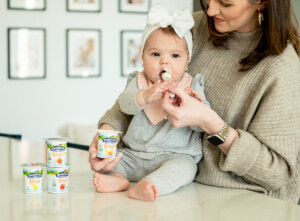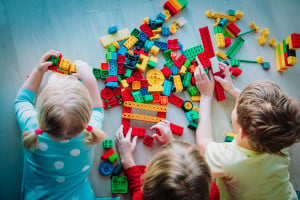Many of today’s dads are more involved than ever in raising their children. They’re experiencing a definitive shift from the father archetypes they were exposed to growing up. The result? Happier, healthier, and more balanced families.
The absentee dad, a strong financial provider, is tired in 2022. Undoubtedly, the long-overdue change is a welcome one for exhausted moms everywhere. So why the shift in how much dads take part in raising their kids?
Old Ideas are Still Around
My husband and I were recently at a colleague’s son’s high school graduation party. It was a special occasion, a proud parenting milestone worth dropping some serious cash on over-the-top decorations.
A dad-to-be at the party talked about the pending arrival of his firstborn son. A group of partygoers eagerly asked his wife about childcare and maternity leave. She delighted in sharing that her husband would join her for a portion of her recovery because of paid paternity leave.
It wasn’t long before some older attendees whose children were starting families of their own chimed in with their disapproval.
“That never existed when I was raising my kids. I don’t know why a dad would even need to be there. He should be at work providing for his family,” one said.
“What is it with men nowadays being so soft?” another chuckled as he threw his hands up in mock curiosity.
The Shift in Dad Involvement
As it turns out, many socioeconomic factors combined with changing social norms are at play.
The share of two-parent households in which both parents work full-time stands at 46%. This is up from 31% in 1970, according to the most recent Pew Research Center analysis. At the same time, the share with a father who works full time and a mother who doesn’t work outside the home has declined considerably; 26% of two-parent households today fit this description, compared with 46% in 1970.1
In recent decades, the changing economic role of women has directly influenced the role of fathers. This is alongside other trends such as increased autonomy of women, decreased fertility rates, increased divorce rates, and increased acceptance of diverse family structures (blended, LGBTIQA+, etc.). All of this requires a transition from traditional fathering roles to something more modern and undefined to manage the changing landscape of families.2
Another factor is the societal shift away from male stereotypes that many have known. Young men today are likely to be selfless, socially engaged, and health conscious, according to a study by market research firm Intensions Consulting in collaboration with the University of British Columbia and published in 2019.3
The researchers believe millennial men are widening their value structure and questioning what it truly means to be masculine.
How Today’s Dads are More Involved
If you’re seeing more dads at the school drop-off, attending ballet recitals, active in the PTA, or volunteering to chaperone the next school dance than when you were growing up, you’re not imagining things.
A study by sociologists at BYU and Ball State published in 2018 found that most modern-day fathers are relatively involved in their children’s lives.4 Taking time to be more involved in school pickups and drop-off routines, mealtime, homework assistance, creative play, and quality time are some of the areas modern dads are more present.
Different Reactions for Different Men?
Of course, different men may react differently to the idea of stepping into a caregiver role in today’s Western societies. Still, the BYU study found a correlation between dads who exhibit negative aspects of traditional masculinity and dads who are less involved with their children.
For men who are sensitive to maintaining their masculine image, concern with losing reputation in the eyes of other men often manifests as adverse emotional reactions to becoming a primary caregiver, according to a study published in 2019 and done by Iowa State University.5 On the other hand, men who are not particularly sensitive to maintaining their reputation in the eyes of other men tend to react positively to becoming primary caregivers.
Social status for men is something that can be viewed (by society) as precarious. Women’s roles are attributed naturally (i.e., becoming a mother), whereas society perceives men as needing to earn and maintain their status. This can create a certain level of anxiety for men, motivate risky or challenging behaviors, and negatively influence things like work-life balance, mental health, aggression, and stress. Men who experience a precarious sense of manhood may find it harder to adapt to the changing roles of men concerning parenting.6
Fatherhood Then vs. Now
Over the years, researchers have assessed how the quality of time between fathers and kids impacts a child’s overall well-being and whether it’s difficult for men to express affection toward children. Increased social bonding with one’s children and enhanced self-esteem and well-being of one’s children were critical findings from a study published in 2001.7,8
The study showed that when fathers are more engaged with their children, their kids have better developmental outcomes. An analysis of four countries, including the United States, found that longer paternity leaves and an increase in the time fathers care for their children relate to higher cognitive test scores.9
A New Ideal
These shifting societal ideas about fatherhood have made room for a “new” fatherhood ideal. We’ve come a long way in giving “permission” for men to break free of old stereotypes and show up for their families. But expectations and pressure on the ways men should support their families persist. There is still a lot of room for improvement surrounding the way many Americans view the division of childcare responsibilities and the expectations surrounding financial contributions between genders.
According to a Pew Research study, the importance of being the sole financial provider ranks behind being caring and compassionate when it comes to being a good spouse or partner.10 In about a third of couples in the United States, women bring in half or more of the earnings. But roughly 7 in 10 adults (71%) say it is vital for a man to support a family financially to be a good husband or partner.
As for those who subscribe to antiquated views, feel free to speak up about the value active parenting provides. Every dad who dedicates time to the late nights, the early mornings, the endless diaper changing, the constant bottle feeding, and doctor’s appointments is building an unbreakable bond. This is a bond built on first steps, soothing screams, scraped knees, and a lifetime of knowing that both parents support their children when they fail and cheer for them when they succeed.















